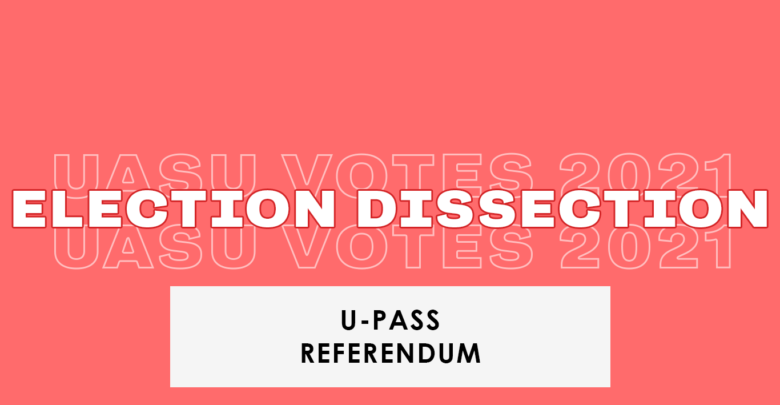Elections Dissection 2021: U-Pass Referendum
The panel agreed the U-Pass was beneficial for many students, especially those who rely on affordable transit to get around the city
 Pia Co
Pia CoEvery year The Gateway hosts a panel to determine who should and who will win in each race for the Students’ Union elections to assist those undecided on who to vote for. Our election dissection panel is here with their insights on student politics and their takes on this year’s candidates.
Opinions expressed by the panelists do not reflect those of The Gateway.
The Panel
This years panel for election dissection included:
- Ashlynn Chand: U of A alumni, former arts and culture editor at The Gateway.
- Stephen Raitz: U of A alumni, past candidate for Students’ Union vice-president (student life).
- Kelsey Fortier: second-year law student.
The U-Pass Referendum
All three panelists agreed on the inherent value of the U-Pass.
“I like the U-Pass, I think it’s very useful,” Chand said. “Even in pandemic times, there are still people who use ETS to get to work or even for mild travel.”
Although she likes the U-Pass, Fortier was “lukewarm” on their campaign this year. For her, the biggest advantage the U-Pass offers to students is the ability to get around town on a budget, rather than just going to the university.
However, she worries some students who rely on the U-Pass won’t be able to access it if their courses are remote. In the agreement students are voting on, only students who have at least one in-person class will be charged the fee — those entirely online won’t be assessed.
“What I’m thinking is, great, you’ve got a job and your classes are online but you still need the U-Pass,” Fortier said. “I wish [the campaign] had gotten into that a little bit more.”
She additionally acknowledged not all students will get the same benefits out of the U-Pass, as many students may not use transit, especially in the midst of a pandemic. However, for the students that rely on affordable transit to get around the city, Fortier believes it’s “vitally important.” By not passing the U-Pass, she is concerned about the fiscal implications it would have on students who are already low-income.
“The most persuasive argument for the U-Pass is that there’s a lot of people that don’t really need it, or don’t really use it — but for the people that do need it, they really need it.”
Sadly, Fortier believes this appeal to altruism was mostly missing, leaving a gap in the U-Pass campaign.
Raitz agreed the proposal wasn’t perfect but thought the campaign did a good job explaining the long-term importance of the U-Pass to students.
“It was buck wild when [the U-Pass] wasn’t available to students,” Raitz said. “One of my favourite things about being on campus was having ready access to transit.”
“They do a good job of explaining why we need to look further into the future and get this access back so we can further plot out better transit accessibility for students…this is about a longer term game-plan.”
Panelists also agreed the four-year price freeze in the U-Pass agreement was a benefit to students, providing students consistency for the foreseeable future.
Overall, the panel unanimously agreed the referefrum should pass, arguing the benefits that it provides students is too important for the U-Pass to fail.
Should win: three votes for yes
Will win: three votes for yes




